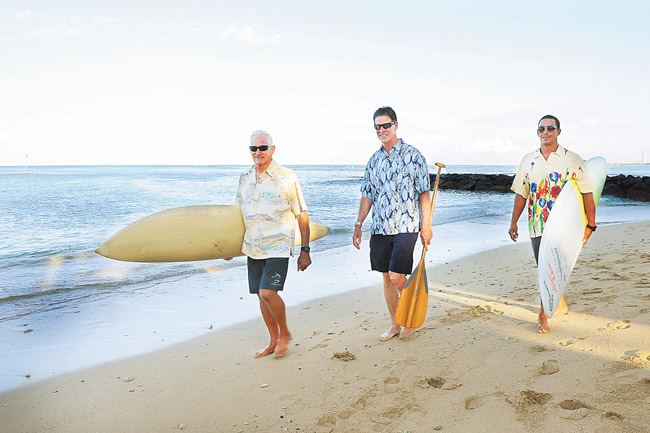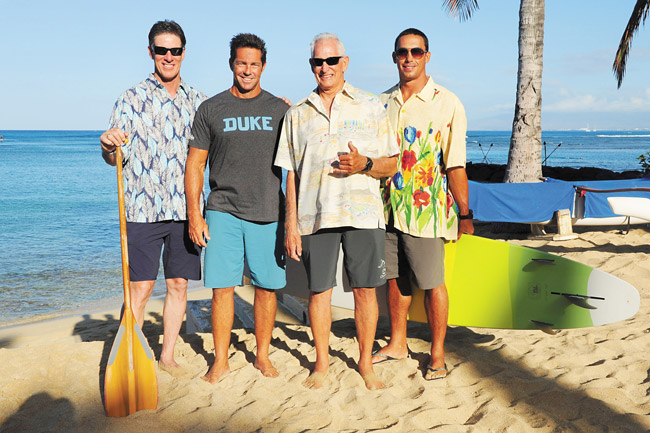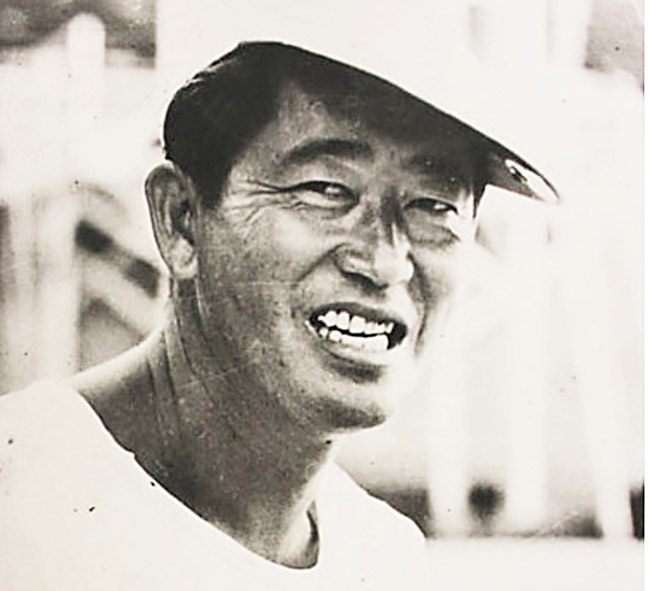Hawaii Waterman Hall of Fame Welcomes 4

(From left) Waterman Hall of Fame inductees Joey Cabell, Walter Guild and Duane DeSoto. Photo by Nathalie Walker
On the occasion of Duke Kahanamoku’s 125th birthday celebration, Outrigger Duke Kahanamoku Foundation announces the newest members of Hawaii Waterman Hall of Fame, as well as the Ambassador of Aloha winner
“In Hawaii, we greet friends, loved ones or strangers with aloha, which means love. Aloha is the key word to the universal spirit of real hospitality, which makes Hawaii renowned as the world’s center of understanding and fellowship. Try meeting or leaving people with Aloha. You’ll be surprised by their reaction. I believe it and it is my creed. Aloha to you.” —Duke’s Creed
On this, the eve of Duke Kahanamoku’s 125th birthday, many publications are touting his accomplishments: the Olympic gold medals won in Stockholm and Antwerp, the legendary 1-mile wave ride from Castles into Waikiki Beach, and the time he saved eight capsized sailors off Newport Beach using only his surfboard and his grit.
But perhaps his more important legacy, the one Outrigger Duke Kahanamoku Foundation (ODKF) wants to perpetuate, is the one that was printed on the back of his business card and reprinted atop this story.
“He passed away before I was born, but his aloha spirit has transcended over the generations,” says Bill Pratt, chairman of Duke 125 Campaign and Hawaii Waterman Hall of Fame. “This is the greatest icon we have. He was not just an athlete; he was an Ambassador of Aloha. His business card talked about greeting everyone with aloha — that is how we should live, that is how all society should live.”

Walter Guild, Bill Pratt, Joey Cabell and Duane DeSoto at Outrigger Canoe Club. Photo by Nathalie Walker
Since 1986, the foundation has gifted more than $2.2 million to the keiki of Hawaii who excel in Duke sports such as surfing, paddling, water polo and beach volleyball, in order to allow them to travel to compete in their sport, attend college or even pursue an Olympic dream. Athletic prowess, however, is not the only criteria to receive a grant.
“We don’t just want the stud jock who kills it at sports but doesn’t go to class,” says Pratt. “They have to do well in school.”
A prime example of that is this year’s top award recipient, Sarah Alohilani Jenkins. She was named 2015 ODKF Ambassador of Aloha winner, providing her with a $10,000 scholarship that she is using to attend Duke University, after turning down both Harvard and Brown.
Hailing from the Friendly Isle, she speaks fluent Hawaiian, graduated valedictorian from Molokai High School, was her swim team leader and donated countless hours of her time to community service. Oh, yeah, and she received a Society of Science Grand Award for the extensive studies she conducted on the adverse effects of mangrove trees on Molokai’s shorelines and reefs.
As Pratt was quick to note on her resume, “and what exactly were you doing when you were 17?”
Helping kids like her is key to continuing the legacy of Duke, according to Pratt.
“We need to perpetuate Duke’s legacy. If it has had that much impact on my generation, and I am looking at my little nieces and nephews, and thinking how do we make sure that they embody the same spirit and respect who he was,” says Pratt. “We need to push it to the next generation so they don’t just see him as a statue in Waikiki.”
To help in this endeavor, ODKF sponsors its annual fundraiser Monday, Aug. 24, at Outrigger Canoe Club, where it will celebrate Duke’s birthday and honor four new inductees into Waterman Hall of Fame, along with a live auction and music by Maunalua. Tickets cost $125.
“These are people who, in their generation’s time, have excelled at sports but also have given back to their community and made their community a better place,” says Pratt.
Let’s meet the four inductees:
Soichi Sakamoto is this year’s posthumous entrant, a swimming coach from Pu‘unene, Maui, who took the underprivileged children of plantation workers and turned them into Olympic champions.
The only swimming pools he had to train in were the irrigation ditches for the fields where the children’s fathers worked. In 1937, he created the “Three Year Swim Club,” so named because he believed he would train these kids to be Olympic champions in time for the 1940 games in Tokyo.
He set a torrid pace, with his kids winning every swim meet they entered in Hawaii in 1938 and the national title in 1939, but even as his team members began to fill the roster of the U.S. Olympic team in 1940, the outbreak of World War II cancelled the next two Olympic Games.
It was a dream delayed but not dashed, as his student Bill Smith (Waterman Hall of Famer 2013) went on to win gold in London in 1948. Sakamoto moved over to Oahu to coach the University of Hawaii swim team and produced several more Olympic medal winners through the remainder of his career, until he retired in 1966.
He died in 1997 at the age of 91, but the tradition of swimming, and more importantly of rising above the station of your birth, carries on.
From the oldest inductee we will progress to the youngest, 37-year-old Duane DeSoto, who despite his years has had a lasting impact on the keiki of Hawaii, not to mention winning the 2010 ASP Pro Longboarding World Title.
“What has been touching is we went to our kupuna, to several of the Hall of Famers, and asked them what they thought about (enshrining) Duane, and most of them ironically said, ‘Why did it take so long to put him in?'” says Pratt.
His work off the pro circuit has been remarkable as founder of Na Kama Kai, a nonprofit organization that educates children on everything about the ocean, from its importance to their ancestors to safety, surfing, paddling and how to correctly rig a canoe. His group teaches 100 kids each month — and does it all free of charge.
“He is a rough-and-tumble Hawaiian from Makaha, and he’s worried that he is too young,” says Pratt about DeSoto’s reticence to be in the Hall, “and I told him, ‘You can cause systemic change, you are the message, people need to be more like you.'”
His knowledge of the ocean also was tapped for the Malama Honua voyage of the Hokule‘a, and it was Desoto who was asked to play the role of Duke at the 100th anniversary celebration of Duke’s visit to Freshwater Bay in Australia in February.
The canoe paddling that Desoto teaches keiki may not have been possible if not for the third inductee, Walter Guild. A lifetime spent paddling canoes and teaching others to do so has helped raise not just awareness, but also popularity of the sport.
He is an eight-time champion of Molokai Hoe Canoe Racing World Championship, and was instrumental in designing and revolutionizing the six-man canoe and the Hawaiian one-man canoe that are so popular today.
He co-founded Canoesports Hawaii, which established the Altres King Kalakaua Regatta, and the world-famous Kaiwi Channel Relay race from Molokai to Oahu in 1990.
The final inductee needs no introduction to anyone who loves surfing: Joey Cabell. One of the premier surfers of the 1960s, he excelled in all variety of surf, from ankle-high to 25-foot monsters.
Known for his speed, his style was akin to downhill skiers, a technique he perfected during the winters he spent in
Aspen, Colo. He won the Makaha International three times — 1963, ’67 and ’68 — and helped revolutionize the sport with his creation of “White Ghost,” his short board that gave him the speed he desired to tear across the faces of waves the world over. A replica of that board will be up for auction at the ODKF fundraiser.
He was a natural selection by Duke in 1965 to be a member of his exclusive Duke Kahanamoku Surf Team, along with Fred Hemmings, Paul Strauch and the late Butch Van Artsdalen. The team would travel to surfing venues and competitions to spread the good word of Aloha and memories of the “Father of Modern Surfing.”
If you would like to attend the event or make a donation to ODKF, visit duke125.org.







